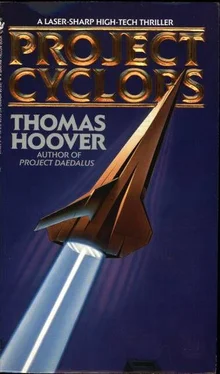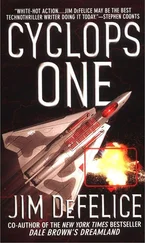Thomas Hoover - Project Cyclops
Здесь есть возможность читать онлайн «Thomas Hoover - Project Cyclops» весь текст электронной книги совершенно бесплатно (целиком полную версию без сокращений). В некоторых случаях можно слушать аудио, скачать через торрент в формате fb2 и присутствует краткое содержание. Жанр: Триллер, на английском языке. Описание произведения, (предисловие) а так же отзывы посетителей доступны на портале библиотеки ЛибКат.
- Название:Project Cyclops
- Автор:
- Жанр:
- Год:неизвестен
- ISBN:нет данных
- Рейтинг книги:4 / 5. Голосов: 1
-
Избранное:Добавить в избранное
- Отзывы:
-
Ваша оценка:
- 80
- 1
- 2
- 3
- 4
- 5
Project Cyclops: краткое содержание, описание и аннотация
Предлагаем к чтению аннотацию, описание, краткое содержание или предисловие (зависит от того, что написал сам автор книги «Project Cyclops»). Если вы не нашли необходимую информацию о книге — напишите в комментариях, мы постараемся отыскать её.
Project Cyclops — читать онлайн бесплатно полную книгу (весь текст) целиком
Ниже представлен текст книги, разбитый по страницам. Система сохранения места последней прочитанной страницы, позволяет с удобством читать онлайн бесплатно книгу «Project Cyclops», без необходимости каждый раз заново искать на чём Вы остановились. Поставьте закладку, и сможете в любой момент перейти на страницу, на которой закончили чтение.
Интервал:
Закладка:
"I know that, Ted," Hansen said.
Brock nodded sheepishly, then continued. "Well, after the insertion, they'd need support from our long-range HH-53 Pave-Low choppers, but only three are flying at the moment. And-"
"I get the picture." The President cut him off. "Transportation is lousy and half the equipment we need is somewhere else or in maintenance. Any other bad news?"
"One thing, an assault would have to be at night. It's the only way that makes any sense. Which means more special equipment. If they go in during daylight, it's going to be a slaughter of the hostages, particularly if these bastards are armed the way we have to assume. And from the looks of everything so far, I'd say they know how the game is played. Which means that even if we do our best, it's going to be tricky. They're going to assume we're coming. The way I figure it, even with no rehearsals, forty-eight hours would be tight."
"We invest millions training the finest counterterrorist units in the world and then they can't be deployed in less than half a week?" He exhaled angrily, remembering a classified internal Pentagon study that claimed the best time to launch a successful assault with the least number of casualties among hostages was within twenty-four hours of their capture. "It's a goddamn outrage."
"Forty-eight hours, minimum, Mr. President. And even so, that's pushing it." He squirmed. "There's a lot of paperwork that'll have to be processed, and-"
"Well, tell Cutter to get the Special Forces mobilized and moving," Hansen interjected. "In the meantime, our job is going to be to try and find out what happened. Do they really have a nuke, and if they do, how in hell did they get it and what are they planning to do with it?"
CHAPTER TEN
"It's very simple," Ramirez said to Jean-Paul Moreau. After the phone call, he had sent Mannheim to the Bates Motel and returned to Launch. Let Washington stew awhile. They were probably now trying to figure out how to get their antiterrorist units into Greece. Their nightmare logistics would be fun to watch. "We have to find them. And get him. Alive if possible, but we can't be fussy. The time to do it will be just after midnight, when we're finished here."
Moreau disagreed. "I'd say the sooner the better. The longer they're free, the more problems they can cause." Crossing Ramirez was not something to be done lightly, but he felt strongly that the operation was not going as smoothly as it should have. It was time for a little damage control.
"Well, he's probably back on the mountain," Ramirez said calmly. "If you want to, then go on up and get him. Take the RPG-7; it's light. But be careful you don't damage anything."
He was right about the weight. At slightly over ten kilos, the RPG-7 was one of the best bangs-for-the-ounce around. It was a guerrilla special, a Soviet-designed 40mm launcher that loosed a rocket with an oversize hollow-charge rocket-warhead 85mm in diameter. Fired from the shoulder, it was deadly against lightly armored vehicles and structures. Used on personnel, it was lethal. They had brought along a Pakistani clone of the latest Soviet model, a two-piece version that was easy to move about, yet assembled quickly.
"But remember," Ramirez went on, "so far all we have to show for trying to take out this nuisance is a wrecked helo. Don't botch it again."
"That was because you left the work to German amateurs," Moreau remarked dryly. "This time I'll take care of it myself. Personally."
"I'm counting on that," Ramirez said, his eyes expressionless behind his gray shades.
9:43 P.M.
"We'll be working together, kid," Dore Peretz was saying. "We're a team." He swept back his mane of salt-and-pepper hair, then moved next to Georges LeFarge. The young engineer didn't like anything about the Israeli, right down to the cheap aftershave he was wearing, but he had to admit the guy seemed unfazed by all the hardware that controlled Big Benny, the Fujitsu supercomputer.
It was a correct assessment. Dore Peretz was definitely in his element. He had taken his Ph.D. from the University of Chicago in 1984, then returned to Israel to accept a high-paying research job at the Weizman Institute, Israel's top- secret nuclear facility near Tel Aviv. During the next seven years he had advanced to the level of senior institute scientist, becoming an expert in every technology connected with nuclear weapons.
From the specialty of mass destruction he graduated to another hot topic-the emerging preeminence of smart weapons. Conventional delivery technologies, the war in the Gulf had shown, were no match for the new "smart" antimissile systems. It was back to the drawing board. What Israel needed in her arsenal was the next generation of weaponry.
He had gone on to head up a research team that played computerized war games, studying the "what ifs" of whole new generations of technologies matched against each other. The end result of this fascination was that he became a computer and missile-guidance expert-which, when added to his knowledge of nuclear weapons, made him a double-threat man.
It also made him perfect for what Sabri Ramirez wanted to do.
When Ramirez found him, he already had departed the institute, and also for reasons that suited Ramirez perfectly. Whereas Dore Peretz had an IQ off the scale, his social development was considered-even by those who tried to like him-as scarcely progressed beyond the infantile. His was an independent… make that irreverent… temperament that was bound to clash with the bureaucracy of a straitlaced place like the institute. He had particular trouble fitting in with the deadly-serious, high-security environment that surrounded military contract research. The problem had been obvious from the first day he arrived, but his genius was such that it had been overlooked and worked around by both sides. His final rupture with the Israeli defense establishment resulted from what-to his mind-was a totally compelling event.
He had personally developed a computer-assist program that provided special procedures for the quick arming of a nuclear device in case Israel found itself facing an imminent attack. It was important, and it worked.
He had expected, reasonably enough, a rousing financial tribute for this effort, or at the very least a citation. What he got instead was screwed. When the yearly Summary of Technical Research arrived on his desk January last, he discovered the computer program had been "created" by the vice president in charge of his section, with the "assistance" of someone named Dr. D. Peretz.
A reaming by an incompetent bureaucrat whom he had hated from the beginning was the last straw. He resigned in traditional style, papering the institute with a fusillade of memos that reviewed in detail the failings of its top management and then for good measure scrambling the electronic combination on his personal safe as he was readying to walk out the door.
At that point he did not know what he wanted to do next, but he was damned sure it would not involve further interaction with a bureaucracy.
Being no dummy, he also fully anticipated the response to his outrage. And sure enough, he found he had transformed himself into a high-profile security risk that Mossad suddenly found very interesting. Israel's intelligence service remembered all too well the case of Mordecai Vanunu, the thirty-one-year-old technician who had worked at the plutonium separation facility at the Dimona complex for nine years, then left in a huff and sold pictures and a detailed description of the facility to the London Sunday Times. Mossad had no intention of letting it happen again.
Dore Peretz was interrogated for weeks, threatened repeatedly, then placed under close surveillance. They had no grounds to arrest him, but they were going to intimidate the hell out of him.
Читать дальшеИнтервал:
Закладка:
Похожие книги на «Project Cyclops»
Представляем Вашему вниманию похожие книги на «Project Cyclops» списком для выбора. Мы отобрали схожую по названию и смыслу литературу в надежде предоставить читателям больше вариантов отыскать новые, интересные, ещё непрочитанные произведения.
Обсуждение, отзывы о книге «Project Cyclops» и просто собственные мнения читателей. Оставьте ваши комментарии, напишите, что Вы думаете о произведении, его смысле или главных героях. Укажите что конкретно понравилось, а что нет, и почему Вы так считаете.












